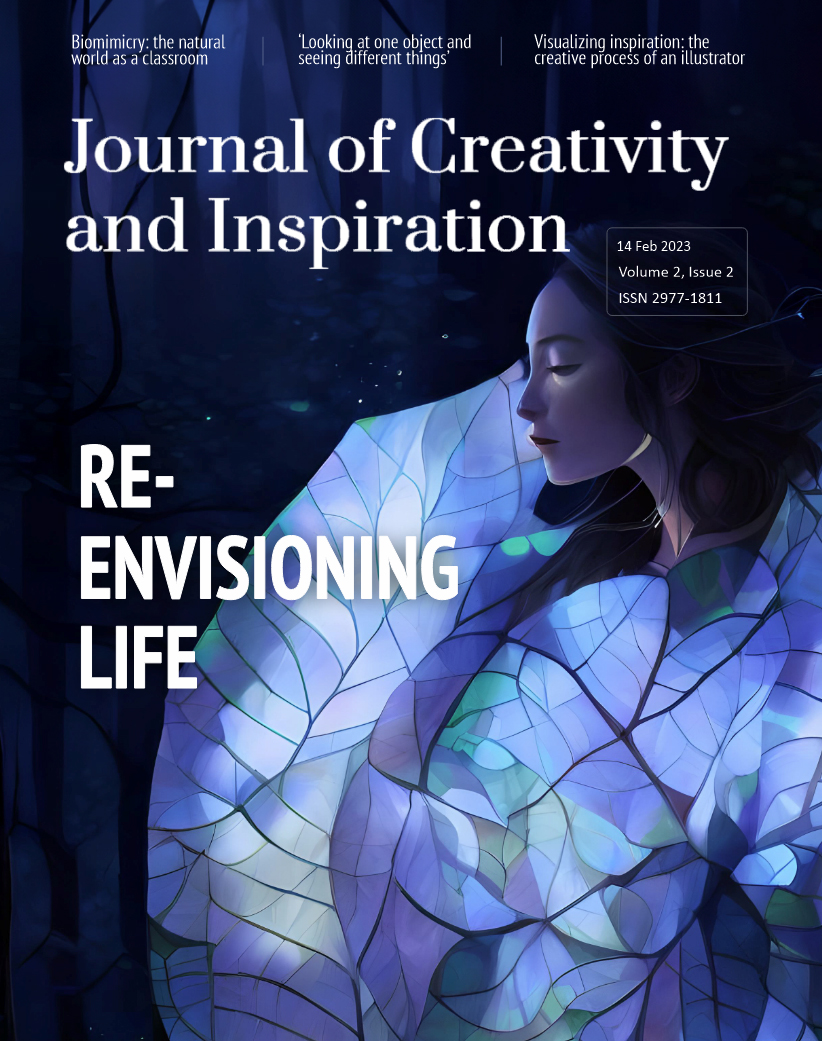The hidden realms within: Gary Lachman interviewed by Gil Dekel
14 February 2024 – Vol 2, Issue 2.
Gil Dekel: What are ‘esoteric traditions’?
Gary Lachman: Each of the major religions has an outer side that is public, historical; the aspect that is most well-known, and they also have an esoteric, inner side. ‘Esoteric’ means ‘inner’. In the 21st century, this has been lumped in with magic, occult, or hermetic, which basically means the inner world, the subjectivity. And there are various psychological, meditative and other practices that are geared towards understanding, changing, enhancing, and intensifying our inner world.
Rather than looking at people ‘scientifically’ as the subject to laws of physics and other constraints, we should consider the inner side that lives within people. I have the feeling that the interior world in many ways is threatened these days. There are various attempts to explain it in terms of the exoteric, in terms of the physical or the material world.
Gil Dekel: Could there be a benefit in explaining the ‘spiritual’ in physical terms? After all, the spiritual, the esoteric, may be physical, just on a level we have not understood yet?
Gary Lachman: We are beings that participate in both worlds, the spiritual and physical. I’ve written about it in a book called ‘The Caretakers of the Cosmos’, which is a very ambitious title… We are human beings that are caretakers or repairers. The central theme is that we are not just physical beings. And it’s not to denigrate the physical, but it’s to point out that there is no need for reduction.
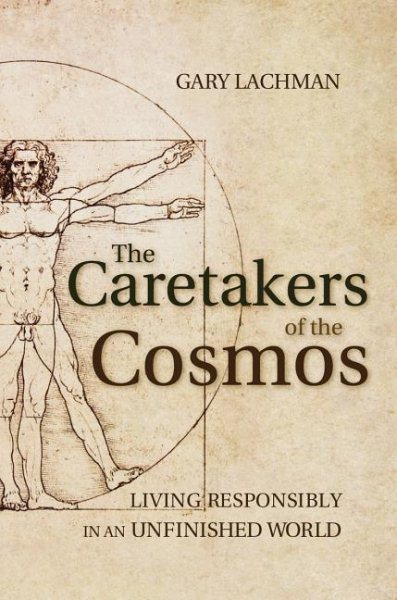
Book cover: ‘The Caretakers of the Cosmos’ by Gary Lachman, 2013.
The narrative of modern science, or the modern view, is reactionary. For example, Francis Crick, one of the discoverers of the DNA molecule, said something about our thoughts, hopes and dreams, being the result of processes of neurons and molecules. This kind of reductionist thinking may have a certain liberating virtue, as people can say ‘You can see that what had seemed to be ambiguous, is actually just the operations of these other things, which we do understand already.’ And so you can understand the attraction to this view.
Gil Dekel: Yes, there should not really be ‘either-or’ approach. What we need is to understand the relationship between the two without reducing one or the other. Let’s talk about the esoteric idea of ‘seeing inside’. How can it help us explore hidden knowledge beyond the physical?
Gary Lachman: Simply as you will be exploring your inner world. This means taking a step back from focusing on the outer world all the time. We tend to have our consciousness focused on the outer world, because we have to deal with things. The outer world in itself is a reduced and edited version of what is actually out there. There are evolutionary reasons for that. In order to manoeuvre through this complex outer world, we tend to involuntarily edit it down. We edit a great deal of the information coming to us from that world and that’s why I think we are the most dominant species – because we do this better than anybody else out there. We’re able to narrow our focus down. Science is all about narrowing. Intellectual pursuits cut out everything that’s irrelevant to what you’re dealing with.
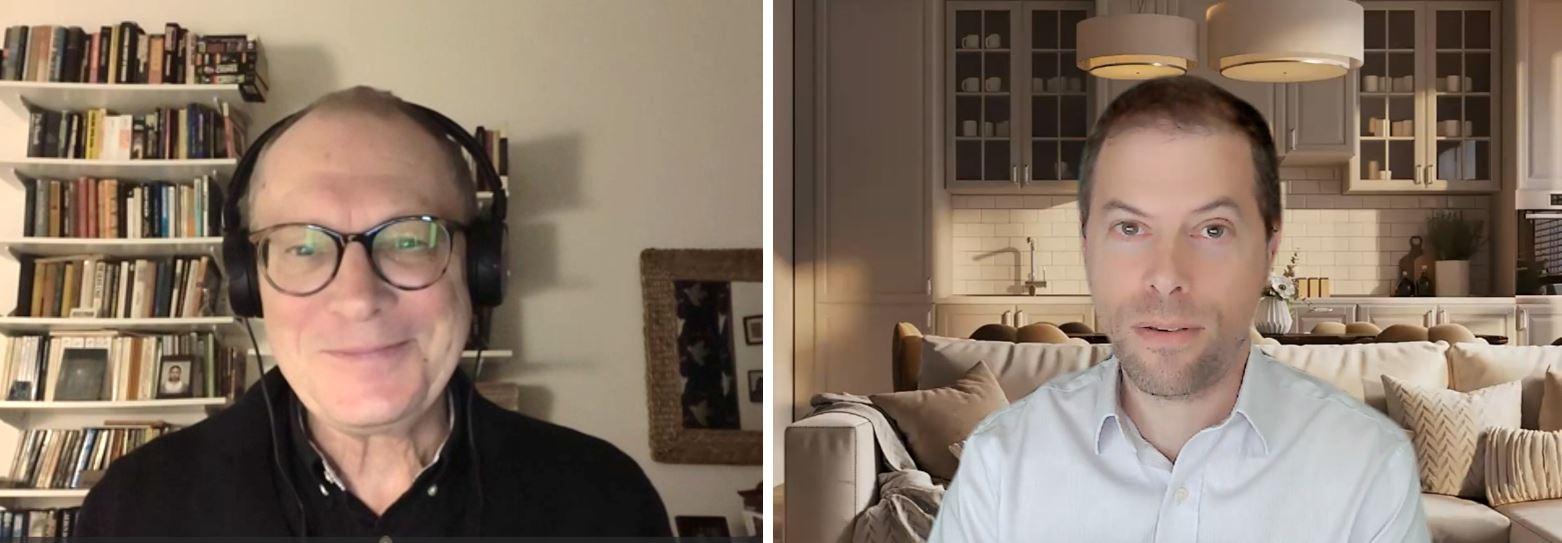
Gary Lachman (left). Gil Dekel (right). 2023.
This comes at a price. You lose the connection to everything else; you lose the context. But there is this other way of having an understanding. It is a direct knowledge that the ancients called Gnosis (a Greek word for knowing). It’s not knowing in a scientific way; it’s knowing in a more immediate, direct, unmediated way. It is when you have a mystical experience, such as looking at a leaf, and you suddenly think, ‘Oh, my God, I’ve never seen this like that before’. You have seen a leaf hundreds of times before, but suddenly you see it in a new way. The leaf itself isn’t any different, but you’re seeing it differently and more of its reality is now coming through.
There’s a movement within Western science and some branches of philosophy to try to explain the interior world as an illusion, or as something that doesn’t exist. That happens fundamentally because the internal doesn’t follow the same laws, the requirements, that form the knowledge in the outer form. The internal just doesn’t work in that way. And so instead of recognising this limitation of knowing things, some people want to get rid of inner experience.
How does it help us understand the hidden knowledge? Well, the very attempt to deal with your inner world will open up that knowledge to you. We have traditions that teach this: the Western hermetic esoteric tradition and Gnosticism, and Kabbalah and alchemy. You can pursue that. Any serious, long-term attempt to become familiar with your interior world will open this sort of thing for you.
Gil Dekel: Did you have a so-called peak experience?
Gary Lachman: Well, I had various experiences at different times. I remember when I was a young musician, we were on tour. It was the first time I came to the UK from New York. This was in 1977. We arrived in London, and I think we just got into a van and drove to Bournemouth that night. I didn’t have any idea where I was. It was exciting for me to be in the UK. I was a real anglophile: I grew up on the Beatles and British music. When I got up the next morning, I went for a walk along a path, and I turned the corner to suddenly see the English Channel. I didn’t expect it. It was a sudden shock seeing the water, the sky. I looked across the English Channel, and somehow I felt it in a more visceral way. A moment of what the Russian philosopher, Peter D. Ouspensky, called ‘self-remembering’. With a sudden vivid awareness of your own being.
This often happens when you find yourself in some place that’s new and different. And you have this sense of ‘Oh, how did I get here?’ These feelings happen at different times. When I was a performer on stage, I would have these moments when you are playing and everything just works perfectly. We may be playing the same song we played a hundred times before, but it suddenly becomes fresh and new and alive. We do have these feelings of being in the flow, the zone, whatever you want to call it. The important thing is to just remember that they do happen. We forget that they happen as we get stuck at times.
Gil Dekel: Moments of remembrance (I call them ‘going home’)… How did Carl Jung, the Swiss psychologist, experience these moments? He had visions where he saw a guide, ‘Philemon.’
Gary Lachman: Jung talks about Philemon as his inner guru, an inner wise old man figure. You could have a guru that’s flesh and blood, that you see, but then there’s also an inner spiritual guru. Jung talks about these fantasies in which he had waking dreams, peak experiences, moments of delight or unexpected happiness.
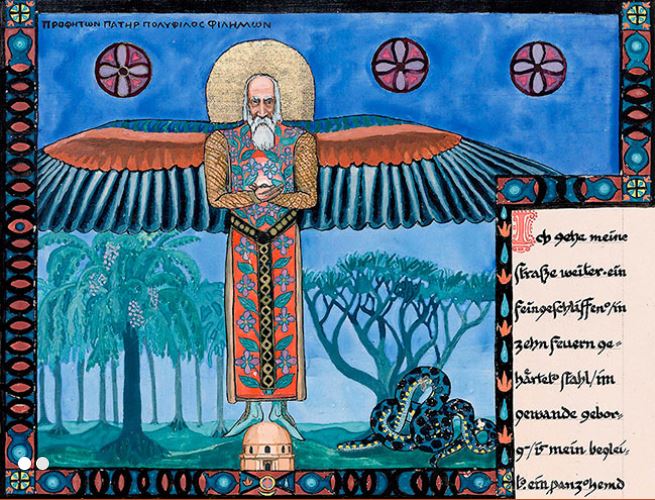
‘Philemon’ by Carl Jung. Image reprinted from The Red Book by C. G. Jung. Copyright © 2009 by The Foundation of the Works of C. G. Jung. Used with permission of the publisher, WW Norton & Company, Inc. All rights reserved.
Colin Wilson uses this phrase: ‘absurd good news’. So, you suddenly get this ‘good news’ experience. But it really isn’t news, rather it is an experience about something you already know in some ways, like seeing a leaf, but in a new way. You see the leaf in full for the first time, and that is why it is ‘absurd good news’, it’s ridiculous…
The inner experience Jung had was different. It was more of a visionary experience. He had encountered figures and personalities. There are different flavours to inner journeys and encounters that people experience. Rudolf Steiner’s experience was more as if looking over a ‘vast historical parade’, a panorama of events where he was seeing the spirit space, if you like. Of cousre, he was an artist as well.
Gil Dekel: Seeing with new eyes…
Gary Lachman: Yes. I’ve written about Kathleen Raine in my book ‘Lost Knowledge of the Imagination’. She says that the imagination doesn’t see different things, it sees things differently. A mystical experience is the same as an everyday experience, but you see the experience from a very different angle.
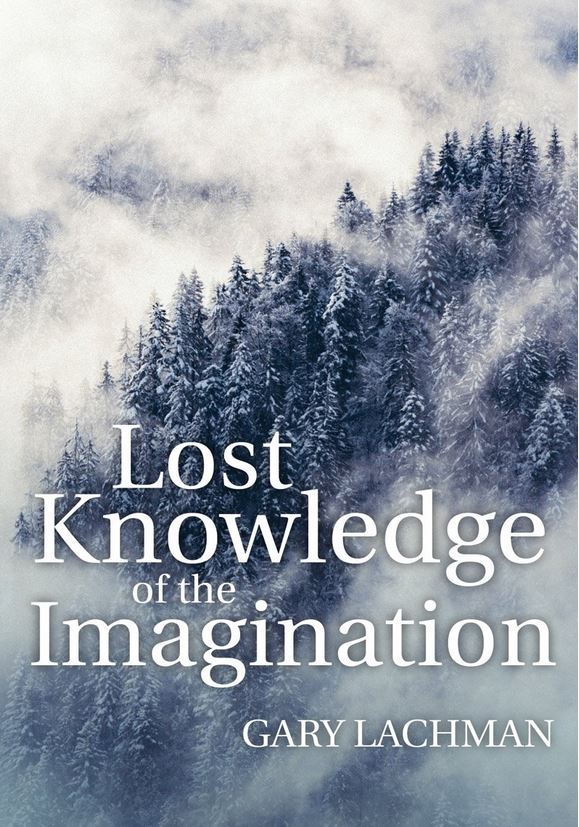
Book cover: ‘Lost Knowledge of the Imagination’ by Gary Lachman, 2018.
Gil Dekel: Heaven is a place on Earth; we just need to see it… On the other hand, I wonder if there is beauty or benefit in the fact that the human brain can attach logic to emotions, and describe emotions with reason? Poetry, for example, is using words, logic, to describe emotions. The brain can ‘connect’ the two.
Gary Lachman: There are polarities in life. Fundamentally, they’re probably all one in some way, but we experience tension between them. Both are necessary, but when one dominates and grows it can become hypertrophy… There’s yin and yang. Without contraries, there’s no progression. Opposition is true friendship. It is a certain kind of tension, a creative tension that propels life, and brings evolution.
Gil Dekel: Yes. You can understand that there is such a thing as ‘up’ only because there is such a thing as ‘down’ – opposites help the brain compare and understand, but is this the case for emotions?
Gary Lachman: I don’t know if the opposition is necessarily between thinking and emotions. It seems you need logic and intellect to come in and hold emotions.
The left side of the brain has this kind of pinpoint precision, like a laser beam that focuses attention down to an incredible level of accuracy. But it achieves that at the cost of losing the connection to the wider whole. The right side of the brain is more ‘present’, it sees a whole, a global, but it has a slightly fuzzy picture of things. It can know things, but it can’t say exactly what.
You can go through the steps in algebra with pinpoint accuracy. This is explicit. But, how to interpret a poem or a piece of music… this is more implicit. Implicit would be the esoteric, it is implied yet you can’t say it exactly. It is a metaphor.
Gil Dekel: Let’s talk about free will. If people have free will, then they can choose. But, if I have free will and choose what I want, then I am obliged to choose it. I have to choose it, since I want it… In a way, this is a contradiction. I have no choice (as I am bound to my will) and therefore have no free will as I must choose what I want…
Gary Lachman: Well, this goes back to Immanuel Kant who said that we must base our actions on pure reason. We can’t be swayed by our emotions and desires. That boils down to the rule of do unto others as you would have them do unto you.
William James, the American philosopher/psychologist, expressed the idea of free will in the context of belief. He said, “My first act of free will shall be to believe in free will”. I personally tend to think that effort is evidence of free will. No machine or computer or AI can make an effort. They can’t decide to try harder… You and I can decide to try harder, whereas no machine can do that. With free will, we can make a choice. Our minds can choose. It can also imagine, and envision possibilities beyond our immediate reality.
Gil Dekel: What is imagination; what kind of faculty is it?
Gary Lachman: Imagination is a word we use for a lot of different things that are going on in our mind. We tend to associate imagination with pictures, images. In dreams, the images can take on a sense of reality, a hyperreality. I would say that there is a bit of reality in imagination itself – it’s not a make-believe; it’s about making real… We tend to grasp reality with our senses. We tend to associate reality with what’s in front of us, at this moment, here now. That is what the senses are presenting us with. But reality exceeds the little tiny ‘patch’ that each of us occupies at the moment. And imagination is the ability to grasp that fact. We tend to limit what we perceive of the world. In those moments when we relax, read a book or listen to music, a kind of opening presents itself, and more reality comes into us. This isn’t necessarily a visionary experience.
We need to understand our interior world, because that is where the spiritual world begins. The universe is anchored in our cells. I’m not denying the outer world. It does exist, yet we don’t experience the spiritual in the outer world. Inwardly, we have moments of profound deep reverence for life. We experience that inside.
So, we should ask: why do we have this physical realm? Madame Blavatsky said that in this physical realm, the spirit can achieve more. So again, this is an evolutionary push. You know, you cannot sculpt with a cloud… A cloud is free, easy and light. You cannot do much with it, as you can do with a solid block of marble, for example. And so there is greater achievement in this physical realm. But it is difficult.
One metaphor that runs through many traditions is the notion that when we come into this physical world, we lose the memory. We are subjected to amnesia, where we forget our origin. We forget why we’re here. We’re here on a mission.
Gil Dekel: Carl Jung seemed to remember his mission. He said: I don’t believe, I know.
Gary Lachman: Yes. Carl Jung had those inner experiences and synchronicities. I wrote a book called ‘Dreaming ahead of time’ where I detail my experiences with pre-cognitive dreams. Those dreams were not intense, like Carl Jung’s experiences, but I know for sure that I had dreams in which the future had appeared. I would wake up knowing that I had a premonition about something that would happen later in the day. It usually is very trivial stuff. But it happened, even as this goes against everything that we know about time – past, present, future. The fact that you can see the future ahead of time, seems completely illogical. But I know for a fact that it is the case. Some things work with synchronicities and some telepathic experiences. From this perspective, I know that the way of seeing the world, the official way, doesn’t cover all the elements of the world. I am willing to accept a wider, more anomalous sort of phenomena like visionary states.
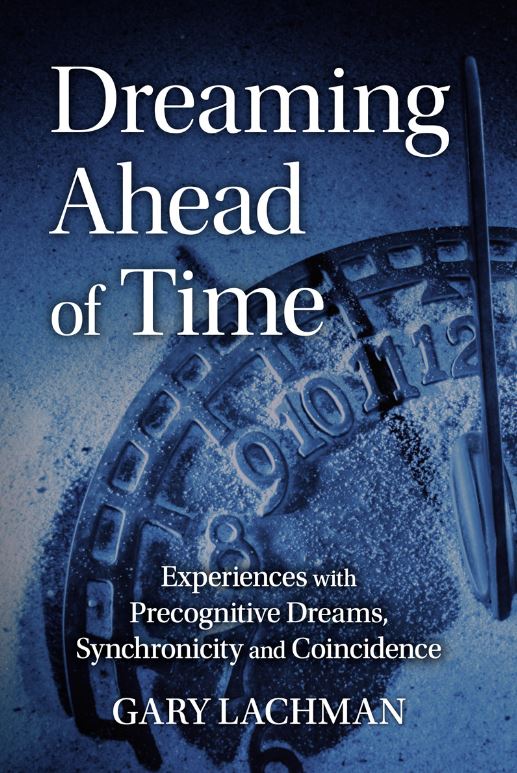
Book cover: ‘Dreaming Ahead of Time’ by Gary Lachman, 2022.
Gil Dekel: I once had a visionary experience while reading a book. Suddenly, I looked up and I saw that time was standing still. There was no time experience. I could see, with my eyes open, the atoms of space moving all around me; the atoms of time, all in one moment. Time is indeed a funny thing. I don’t think it really exists. Perhaps it is the construct of the human mind, a construct of the language that we use?
Gary Lachman: Yes, but you still have to get up at a certain time in the morning.
Gil Dekel: Of course. That is because we choose to use that ‘language’ in our daily life. It is a very useful tool to arrange our days.
Gary Lachman: Yes, and in one sense we seem to know what time is; we use time all the time… In another sense, when we start to examine it, it’s very strange. St. Augustine said that if no one asks him what time is, then he knows what it is, but if he is asked, then he does not know how to explain it. So, in a way we know time implicitly, but if you want to pin down time in some explicit way, then it’s already gone. The moment of this present is gone. The moment you describe time in the present, it has gone and turned into the past. Does time end somewhere and if it does, then what was on the other side of it within the boundaries of everyday life.
I think that dreaming the future happens to everybody. If you just pay attention, you will see it every now and then. If you studiously write those dreams down, whenever you have them, if you pay attention to what happened to yourself in the day, which is always a good practice anyway, you will see bits of pieces of the future that have turned up in your earlier dreams. This is how I discovered that it works in my dreams. I started to write down my dreams back in the 1980s and then noticed that the dreams portrayed things that happened later in the day.
Gil Dekel: I think that in dreams we do not operate on logic but through emotions. So, the dream narrative moves from one event to the other, based on emotional links between the events. And therefore time does play a part. The dream story is not based on the linearity of logic or time.
Gary Lachman: Yes, and of course we need to determine logic. Logic is associative thinking, and also metaphoric thinking. Dreams convey symbols. Sometimes in dreams, the clarity is so vivid, better than any super HD monitor. Dreams are crisp. You can almost grab them. This suggests that we have this incredible artist inside ourselves. Who is responsible for generating the dreams? Well, it’s not me but it’s part of me. It’s not me voluntarily. I cannot decide on it. But it’s partly me because it happens inside me.
As humans we have self-consciousness, and so we ask questions. Walt Whitman, the American poet said that animals and nature don’t bother themselves about anything. Nietzsche said that it wouldn’t be any good to ask the cows about the secret of their happiness, because they would forget the question before they could formulate the answer. So, is there a blessing in being unconscious, an unconscious bliss? That is perhaps the secret of their happiness. I think that we could still be in the world and be happy, but also keep remembering what our mission is. We find ourselves in this world, which is not easy with all the problems of being self-conscious. And we wonder what is it all about? A tree probably does not wonder what it is all about. But we somehow give meanings and understanding to things that would otherwise be mute.
We have to take care of the physical world, but also take care of the inner. The meaning I perceive about the sunset is part of the sunset. It’s not something I just slap onto the sunset, rather it’s part of the sunset. But it would not exist if I wasn’t there, to bring it into being.
© Journal of Creativity and Inspiration.
Images copyright as specified.
Gary Lachman is the author of twenty-one books on topics ranging from the evolution of consciousness to popular culture and the history of the occult. He has written biographies of Aleister Crowley, Rudolf Steiner, C. G. Jung, Helena Petrovna Blavatsky, Emanuel Swedenborg, P. D. Ouspensky, and Colin Wilson, as well as histories of Hermeticism and the Western Inner Tradition. His books also cover existentialism and the philosophy of consciousness.
Gil Dekel is a doctor in Art, Design and Media, specializing in processes of creativity and inspiration. He is a lecturer, visionary artist, Reiki Master/Teacher, and co-author of the ‘Energy Book’. He was awarded the Queen Elizabeth II Platinum Jubilee Coin, in recognition of his dedication and commitment to pastoral work at Hampshire Constabulary.
